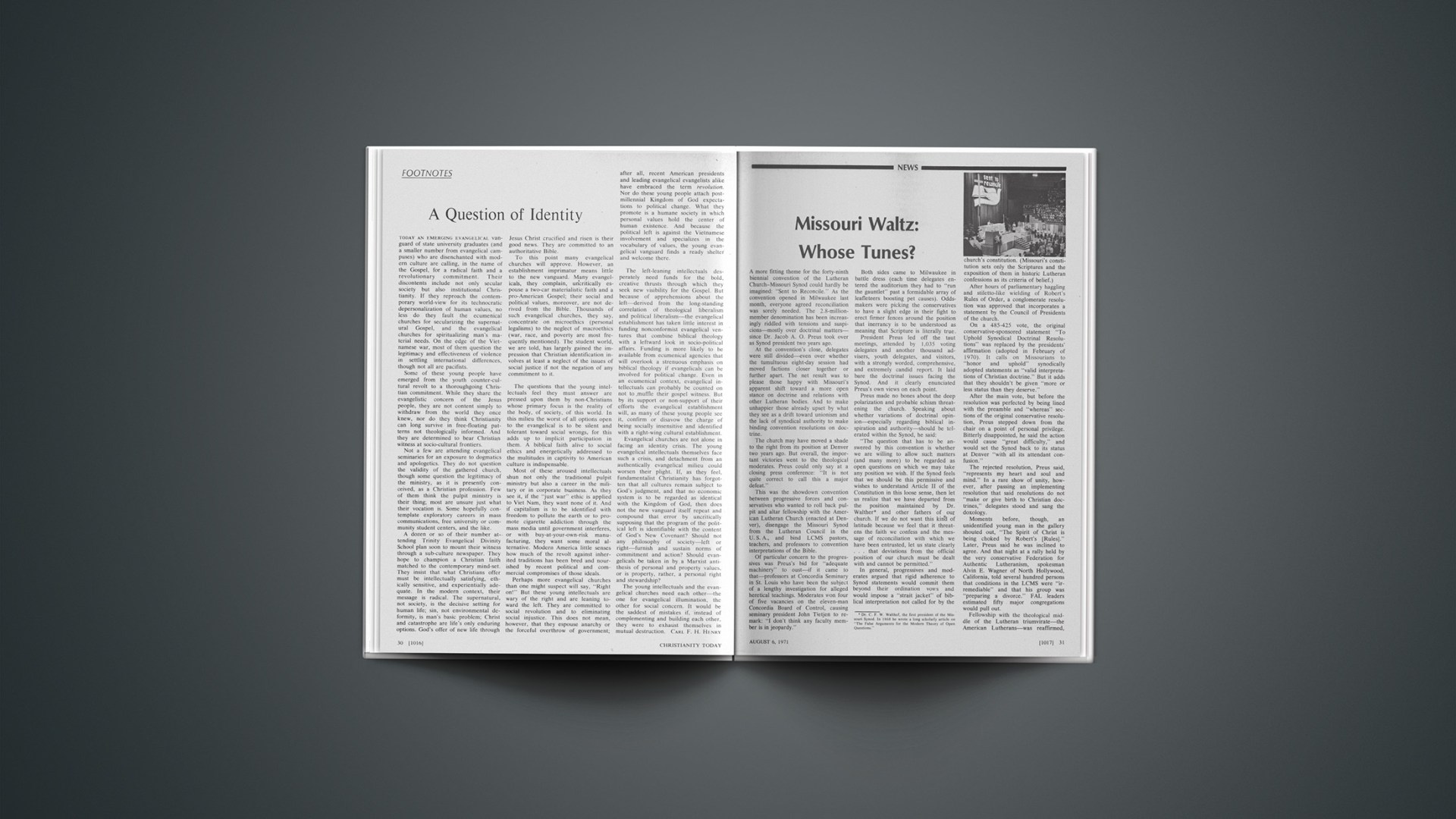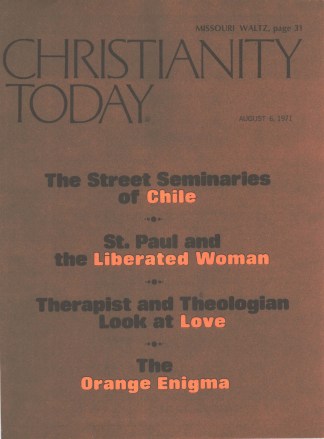Today an emerging evangelical vanguard of state university graduates (and a smaller number from evangelical campuses) who are disenchanted with modern culture are calling, in the name of the Gospel, for a radical faith and a revolutionary commitment. Their discontents include not only secular society but also institutional Christianity. If they reproach the contemporary world-view for its technocratic depersonalization of human values, no less do they fault the ecumenical churches for secularizing the supernatural Gospel, and the evangelical churches for spiritualizing man’s material needs. On the edge of the Vietnamese war, most of them question the legitimacy and effectiveness of violence in settling international differences, though not all are pacifists.
Some of these young people have emerged from the youth counter-cultural revolt to a thoroughgoing Christian commitment. While they share the evangelistic concern of the Jesus people, they are not content simply to withdraw from the world they once knew, nor do they think Christianity can long survive in free-floating patterns not theologically informed. And they are determined to bear Christian witness at socio-cultural frontiers.
Not a few are attending evangelical seminaries for an exposure to dogmatics and apologetics. They do not question the validity of the gathered church, though some question the legitimacy of the ministry, as it is presently conceived, as a Christian profession. Few of them think the pulpit ministry is their thing; most are unsure just what their vocation is. Some hopefully contemplate exploratory careers in mass communications, free university or community student centers, and the like.
A dozen or so of their number attending Trinity Evangelical Divinity School plan soon to mount their witness through a sub-culture newspaper. They hope to champion a Christian faith matched to the contemporary mind-set. They insist that what Christians offer must be intellectually satisfying, ethically sensitive, and experientially adequate. In the modern context, their message is radical. The supernatural, not society, is the decisive setting for human life; sin, not environmental deformity, is man’s basic problem; Christ and catastrophe are life’s only enduring options. God’s offer of new life through Jesus Christ crucified and risen is their good news. They are committed to an authoritative Bible.
To this point many evangelical churches will approve. However, an establishment imprimatur means little to the new vanguard. Many evangelicals, they complain, uncritically espouse a two-car materialistic faith and a pro-American Gospel; their social and political values, moreover, are not derived from the Bible. Thousands of such evangelical churches, they say, concentrate on microethics (personal legalisms) to the neglect of macroethics (war, race, and poverty are most frequently mentioned). The student world, we are told, has largely gained the impression that Christian identification involves at least a neglect of the issues of social justice if not the negation of any commitment to it.
The questions that the young intellectuals feel they must answer are pressed upon them by non-Christians whose primary focus is the reality of the body, of society, of this world. In this milieu the worst of all options open to the evangelical is to be silent and tolerant toward social wrongs, for this adds up to implicit participation in them. A biblical faith alive to social ethics and energetically addressed to the multitudes in captivity to American culture is indispensable.
Most of these aroused intellectuals shun not only the traditional pulpit ministry but also a career in the military or in corporate business. As they see it, if the “just war” ethic is applied to Viet Nam, they want none of it. And if capitalism is to be identified with freedom to pollute the earth or to promote cigarette addiction through the mass media until government interferes, or with buy-at-your-own-risk manufacturing, they want some moral alternative. Modern America little senses how much of the revolt against inherited traditions has been bred and nourished by recent political and commercial compromises of those ideals.
Perhaps more evangelical churches than one might suspect will say, “Right on!” But these young intellectuals are wary of the right and are leaning toward the left. They are committed to social revolution and to eliminating social injustice. This does not mean, however, that they espouse anarchy or the forceful overthrow of government; after all, recent American presidents and leading evangelical evangelists alike have embraced the term revolution. Nor do these young people attach post-millennial Kingdom of God expectations to political change. What they promote is a humane society in which personal values hold the center of human existence. And because the political left is against the Vietnamese involvement and specializes in the vocabulary of values, the young evangelical vanguard finds a ready shelter and welcome there.
The left-leaning intellectuals desperately need funds for the bold, creative thrusts through which they seek new visibility for the Gospel. But because of apprehensions about the left—derived from the long-standing correlation of theological liberalism and political liberalism—the evangelical establishment has taken little interest in funding nonconformist evangelical ventures that combine biblical theology with a leftward look in socio-political affairs. Funding is more likely to be available from ecumenical agencies that will overlook a strenuous emphasis on biblical theology if evangelicals can be involved for political change. Even in an ecumenical context, evangelical intellectuals can probably be counted on not to muffle their gospel witness. But by its support or non-support of their efforts the evangelical establishment will, as many of these young people see it, confirm or disavow the charge of being socially insensitive and identified with a right-wing cultural establishment.
Evangelical churches are not alone in facing an identity crisis. The young evangelical intellectuals themselves face such a crisis, and detachment from an authentically evangelical milieu could worsen their plight. If, as they feel, fundamentalist Christianity has forgotten that all cultures remain subject to God’s judgment, and that no economic system is to be regarded as identical with the Kingdom of God, then does not the new vanguard itself repeat and compound that error by uncritically supposing that the program of the political left is identifiable with the content of God’s New Covenant? Should not any philosophy of society—left or right—furnish and sustain norms of commitment and action? Should evangelicals be taken in by a Marxist antithesis of personal and property values, or is property, rather, a personal right and stewardship?
The young intellectuals and the evangelical churches need each other—the one for evangelical illumination, the other for social concern. It would be the saddest of mistakes if, instead of complementing and building each other, they were to exhaust themselves in mutual destruction.










